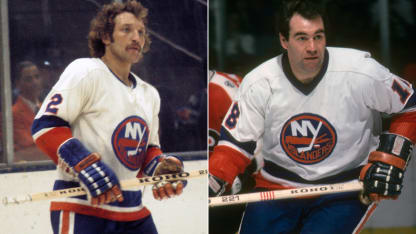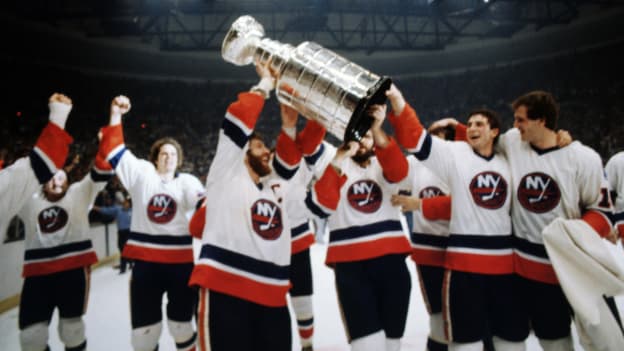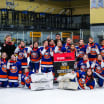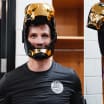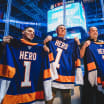Smith was an exception to the Expansion Draft rule. Torrey's other picks hardly had been -- or would ever be -- headliners; with two notable exceptions -- Ed Westfall and Gerry Hart.
Westfall was a certified pilot who had his own plane, a ton of NHL leadership experience and a pair of Stanley Cup rings, courtesy of the 1970 and 1972 Boston Bruins.
In some ways the Expansion Draft acquisition of Westfall was equal in quality and better in timing than that of Smith. "Eddie was ready to excel for us immediately," added Torrey. "With Smitty it took a bit longer."
Apart from his Cup experience, Westfall brought a whole bunch of assets. Writing in his definitive book, "Players," historian Andrew Podnieks raved about Westfall as an Expansion Draft prize.
"Eddie was a scorer, a checker, a shadow and one of the best penalty-killers in the league both in Boston and later with the Islanders," according to Podnieks. "The Islanders got another player based on another kind of situation than Westfall previously had in Boston."
A lesser Expansion Draft -- but still extremely useful -- pick was defenseman Gerry Hart, who originally cut his puck teeth in distant Flin Flon, Manitoba playing for the town's notorious Junior team, the Bombers. One of Hart's teammates was Philadelphia Flyers legend Bobby Clarke.
As an Islander, Hart turned into a rugged defenseman whose truculence made him an instant fan favorite. He already had played his first four years of pro with Detroit but made his most significant marks in Nassau.
Podnieks: "As an Islander, Hart proved to be a valuable addition although he was as unglamorous a defenseman as Denis Potvin would be smiles and spotlight.
"He scored as few goals as Mike Bossy scored many. But he rarely missed a game and went into the corners to fish the puck out with the same enthusiasm night after night."
In a sense another of Torrey's other Expansion Draft picks proved useful to the franchise in the long run and that was a fine checking forward named Terry Crisp.
"We liked him as a player," said Devellano, "but he was most useful to us as trade bait. Late in our first season, Bill sent Crisp to Philadelphia for (defenseman) Jean Potvin. Once we got Potsy, we knew we'd be able to sign his kid brother Denis.
"As just about everyone now knows, Denis became the foundation of this team. But having Crisp was what helped us get Johnny and, finally, Denis who eventually would become a Hall of Famer."
When the Islanders opened their first training camp in Peterborough, Ontario in September 1972 they had amassed 60 men -- give or take a couple of holdouts -- which they would need to sift through and whittle down to the final team that would take to the ice on October 7 in their season opener.
An exception among Torrey's lesser picks was forward Craig Cameron. "We got 19 goals out of Craig in his first season with us," chuckled Torrey, "more than we had expected."
As a youngster, Cameron had cups of coffee with Detroit, St. Louis and Minnesota. Those teams viewed him as a non-scoring utility checker. That changed for the better on the other hand in Uniondale.
A handful of Expansion Draft picks, Brian Marchinko (32 games), Ken Murray (39) and Jim Mair (49), played fewer than 50 games with the organization. Seven players - Garry Peters, Larry Hornung, Ted Hampson, John Schella, Ted Taylor, Norm Ferguson and Bart Crashley - never played a regular season game for the team. The now-defunct World Hockey Association had poached them from the Islanders.
"Looking backward at that Expansion Draft," Westfall concluded, "we got very few NHL caliber players. But the fans expected us to do our best; and that's what we did with what Bill got!"
Because of the dreadful dearth of talent, the Isles earned a nickname in that first (1972-73) season due to their propensity for cellar-dwelling.
"They began calling us 'The Hapless Islanders,'" Devellano recalled. "Well, that was true enough. But because we were in last place, it also meant that we picked first in the 1973 Entry Draft."
Then a pause and a wide grin. "That's when we got Denis Potvin -- and we would never would be 'hapless' anymore!"

